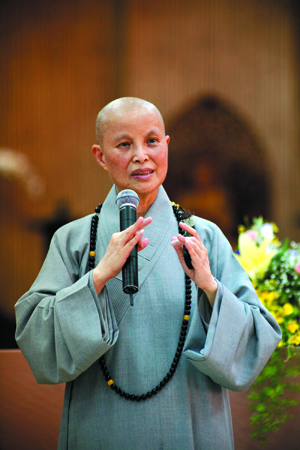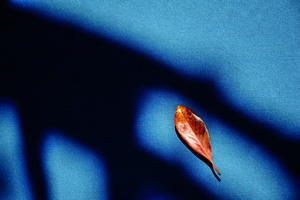

| Resolve Bad Karma, Sow Blessings | ||||||||
| By Dharma Master Cheng Yen Translated by Teresa Chang | ||||||||
Chen Wei (陳微), a Tzu Chi recycling volunteer from Taoyuan, northern Taiwan, started collecting recyclables in her neighborhood more than ten years ago. She began one day when she went to a market and heard that Tzu Chi was calling on people to do recycling. She’s 91 this year, but she’s still agile and fit. Sometimes she collects enough in just one week to fill a truck. When she sees plastic bags or pieces of cardboard, no matter how hard they are to reach, she picks them up—even if she has to bend down low or get down on her knees to get them out from where they are stuck. At times she collects cardboard boxes taller than she is, but she has no problem flattening them and tying them up neatly. Not only does she love the Earth and cherish resources, but she has also formed good affinities with many people. Her neighbors give her recyclable garbage, which they have taken care to clean. Her children take very good care of her too. Her son even asked her to move in with him and his family, but she declined because she said only her old house had adequate space to store the recyclables. Seeing how doing this work was making their mother healthy and happy, her children all supported her decision. Chen says that doing recycling is good for her health and has kept her happy and content. She has nothing to ask from life except two wishes: that she can pass on the spiritual merits she has accumulated to her children and that she can live a few more years to help me with more charity work. She will continue to contribute until she no longer can. Chen is very blessed to have good children and good neighbors. People meet each other in this life because of the karmic conditions they created in their past lives. If they developed good relationships with others in previous existences, they will be happy to meet one another in this life. It is therefore important to cultivate good affinities with everyone around us. If we can give to others and sow abundant blessings, we’ll be liked by everyone we meet.
Sow what you want to reap In The Sutra of Miscellaneous Treasures, there is a story about two brothers. The older one thought that farming was backbreaking work and too much for him, so he handed over his farming duties to his younger brother. Believing that he’d fare far better by seeking heavenly blessings, he visited a shrine every day with sumptuous offerings and sincerely prayed to a deity there for blessings. With his supernatural power, the deity saw that the older brother had never helped others in his previous lives, nor had he done anything to benefit mankind in this life. All he had ever done was seek good fortune for himself. “Since he has never sowed any good karmic causes, how can I give him good fortune now?” Yet on the other hand, the deity saw how sincerely pious the brother was. If he did not receive the blessings he sought, he might become angry and start saying bad things about the effectiveness of praying. That would not be good, either. After thinking it over, the deity decided to instill some good sense in the man. The deity transformed himself into the man’s younger brother and showed up in the shrine. Upon seeing what he thought was his younger brother, the older brother blurted out, “Why aren’t you working in the fields? Why did you come here?” The younger brother replied, “Like you, I also want to ask the deity to bestow blessings on us so that our fields can produce a bountiful yield without us having to work at all.” At this explanation, the older brother scolded him: “How would that be possible? How can anything grow in our fields if you don’t sow seeds and cultivate the land?” “Exactly!” the deity said, as he appeared in his real form. “As you sow, so shall you reap. It’s impossible to reap without sowing. You never planted any seeds of good fortune in your past lives, nor have you done any good in this life. How can I possibly give you blessings now? I suggest that you start helping the needy and contributing to the welfare of society. When the conditions are ripe, you will reap the good fruit without ever having to pray for blessings.” We create our own good fortune or our own misfortune. This is the karmic law of cause and effect. If we want blessings, we have to sow the seeds for them first. If we can embrace Right View, Right Thought and Right Mindfulness, if we can deal with all people and events with sincerity and relieve suffering with great compassion, we will reap good fruit. We must also keep a broad mind when we interact with people. When others say unpleasant things to us or give us bad looks, we shouldn’t give in to anger or resentment. Instead, we should be grateful at all times and constantly reflect on ourselves and improve ourselves as a way to dissolve bad affinities and create good ones. This is the way to lead to a blessed life.
Make positive impacts with love The Buddha teaches us that the world is impermanent. This teaching was proved true once again on July 31, 2014, when a series of explosions caused by underground gas leaks killed 32 people, injured over 300, and damaged more than 600 homes in Kaohsiung, southern Taiwan. Tens of thousands of people were affected by the calamity. In the month following the disaster, Tzu Chi volunteers put in over 43,000 person-times to render aid. They offered meals, provided daily supplies, and visited households affected by the calamity. They also gave out relief cash to families whose houses were damaged as well as tuition aid to needy students. They are currently still caring for more than 500 households.
Since Tzu Chi was founded, over 48 years ago, our volunteers have paved their paths with sincerity and love, always working together to give timely help to suffering people. By giving to the less fortunate, they gain a deeper understanding of the truth of suffering and come to cherish their own happiness, peace and safety. As they learn to count their blessings, they hope that everyone around the world will also enjoy the same peace and safety. On November 8, 2013, Typhoon Haiyan hit Leyte, the Philippines, causing widespread devastation and turning cities into ruins. When Tzu Chi volunteers went to the disaster area to survey the damage, they saw survivors, benumbed and helpless, sitting around in the ruins. Our volunteers felt for them, and they decided to do what they could to help the people and the land recover. One delegation of volunteers after another, coming from 11 countries, visited the disaster area and worked in relays. They gave survivors hugs and heartfelt care. They delivered relief goods, conducted free clinics, and kicked off a large-scale work relief program in which survivors were paid for cleaning up their own communities. During a course of over 20 days, Tzu Chi volunteers, energized by an abundance of love, helped revive hope and confidence in the hearts of the victims and bring life back to the ravaged cities and towns. After providing prefabricated classrooms for schools damaged in the typhoon, our foundation continued to plan the construction of prefabricated houses in Ormoc and Palo, both in the province of Leyte, for survivors who had lost their homes. Volunteers in Taiwan worked hard to prepare the housing materials. In September 2014, materials for over a thousand houses were shipped to the Philippines. Volunteers flew from Taiwan to teach local residents how to erect the temporary housing. Another cash-for-work program was initiated by Tzu Chi. Men did the heavy construction work while women and children prepared bamboo sticks to be embedded in concrete flooring bricks to reinforce the bricks. Whole families worked together to build their own homes.
The weather over there was changeable, and many volunteers caught cold. Despite that, the first thing they all said when they shared their experiences volunteering in the disaster area was: “I’m grateful that I had the chance to go to the Philippines.” They paid all their expenses from their own pockets and did hard work, but still they were full of gratitude. They truly epitomized what I often say: “Blessed are those who derive joy from doing good.” When you give willingly, then no matter how difficult the work is, you feel happy. At the same time, you help your own wisdom-life [as opposed to physical life] grow. With love, we can all make a difference. When all of us nurture kindness in our hearts and act on it, our world will be filled with peace and every family with happiness.
The karmic law of cause and effect The world is full of all kinds of sufferings, which can arise from natural and man-made disasters, from aging, illness, or death. What’s the ultimate cause of this endless suffering? It’s all from the karmic law of cause and effect. In our daily lives, we plant a karmic seed with everything we do, think, or say. Each seed sprouts at some time in the future, and we’ll have to bear the result of what we did. Another story in The Sutra of Miscellaneous Treasures illustrates this. In a kingdom called Kophen, there was an accomplished spiritual cultivator who had become an arhat [one who has reached enlightenment according to Theravada Buddhism]. He lived alone deep in the mountains while his disciples traveled to different places to spread the Buddha’s teachings. One day, he went out to pick some plants to dye his monastic robes. After he returned with the plants, he boiled a big pot of water and put the plants in. When the water had changed color, he threw in the robes. At the same time, a cattleman who had lost a cow was searching high and low for his missing animal. He came to the cultivator’s hut and went in. When he saw the boiling pot of red water with something resembling a cow’s skin floating in it, he jumped to the conclusion that the monk had killed his cow. In the heat of anger, he filed a lawsuit and had the monk arrested. Instead of defending himself, the cultivator didn’t say a word. He was locked up for 12 years. During this time, the monk’s disciples looked everywhere for their master, but to no avail. Then, 12 years later, while he was meditating, one of them saw that their master was in prison. They hurried to the jail to find him. Having endured hard labor every day for the past 12 years, their master had become thin and haggard, and his hair had grown very long. He was much changed. Still, with just one look, the disciples knew for certain that he was their master. They went to the court and explained that their master was a spiritual cultivator who had reached arhathood and that he was virtuous and upright in conduct. They explained that there was no way that he could have killed the cow. The court summoned the cattleman. The cattleman said, “I’m very sorry. When my cow got lost, I was so upset that when I saw the blood-red water in the pot, I was convinced that the monk had killed my cow. Yet, some time later, the lost cow returned. I didn’t lose it after all.” When the court apologized to the wronged cultivator, a smile spread across the cultivator’s face. Then, using his supernatural power, he shed his long hair and beard. His prison clothes disappeared and were replaced by a monastic robe. Looking once again like a monk, he levitated above the ground and sat in lotus position in midair. Everyone knelt down and prostrated themselves before him. An official asked, “Since you have supernatural powers, why did you endure all this for 12 years?” With an aura of peace, the master answered: “Once in a past life, I was also a cattleman. One day when I was looking for a missing cow, I ran into a pratyeka-buddha [one who has achieved enlightenment on their own, without the help of teachers or guides, according to some schools of Buddhism]. He was cooking something in a pot. Without clarifying the matter with him, I went straight to the court and accused him of killing my cow. Because of this bad karma I created, I was reborn in hell for many lives. Through those many lives, I repeatedly repented and vowed that if I could leave hell, I would do my best to cultivate myself. Now, having been imprisoned for 12 years, I’ve repaid all my karmic debt. I am grateful and at peace now.” Even if we have supernatural powers, we are no match for the power of karma. If we don’t understand the Four Noble Truths and the Twelve Links of Dependent Origination, we are likely to complain when we encounter adversities. We might even back out of our commitment to our spiritual practice. On the other hand, if we truly understand that everything is due to the karmic law of cause and effect and sincerely repent of all the bad karma we have created, we will have peace in our heart and accept all tribulations willingly. When that happens, we will be able to turn afflictions into paths leading to enlightenment. ● Birth, aging, illness, and death are all parts of the natural course of life. No one is exempted from this cycle. When we get old, our energy naturally declines, and if we fall ill, we might feel that we’re near death and our hearts might panic. Actually, this is a good time to examine ourselves. We should ask ourselves whether through our lives we have been dedicated to improving ourselves, making life better for our families, and contributing to the well-being of society, or whether we have just allowed our time to slip by in vain by sitting around idly or engaging in idle pursuits. We should ask ourselves whether we persisted in doing something that we knew was the right thing to do. And when we knew something was wrong to do, did we immediately stop doing it? If our minds are constantly wavering and we have no command over ourselves, we are bound to lead an aimless and purposeless life. Such a life is actually not pleasant at all. It’s up to us to determine the direction of our lives and to decide whether we want to live a life of value. The Dharma can nourish our minds and lead us to a fuller life. When we have been exposed to the Dharma, we must take it to heart and cultivate ourselves accordingly. We must do so in earnest, and not slack off whenever we feel like it. Let us embrace and live out the Dharma at every moment. That way, our hearts will be filled with spiritual joy and we won’t stray from the right path. In an effort to help free people from all kinds of mental defilements and afflictions, the Buddha preached the Dharma to them according to their levels of understanding. He hoped very much to guide everyone to the path leading to awakening. When the Enlightened One was about to enter nirvana, having expounded the Dharma for 49 years, his mind was still on all living beings, on passing on the Dharma and keeping it alive. Bodhisattvas from other worlds appeared before the Buddha and told him not to worry; they said they would continue to propagate the Dharma after he entered nirvana. But the Buddha did not give them his approval. Instead, he fixed his eyes on his disciples that were present. Finally Sariputra, the wisest of his disciples, stood up and said, “We truly want to take up the responsibility of passing on the Dharma, but the people in this world are too recalcitrant and stubborn to be taught. Thus we have qualms about accepting the challenge.” Human beings are indeed recalcitrant and stubborn, but since all of us in Tzu Chi have committed ourselves to Mahayana Buddhism [the “Greater Vehicle,” concerned with the salvation of all living creatures], we must forge forward and bring help to the wider world. No matter how much hard work we have to endure, we have made it our mission to give to others. We must remain undaunted by any hard work and keep our hearts pure and unpolluted while carrying out our mission. Time ticks by second after second. Our lives dwindle away minute by minute. How can we afford to squander our time? We must seize time to learn the Dharma, stay true to our original aspirations, and prevent mental impurities from entering our minds. When we do our best to enrich ourselves with the Dharma and accumulate blessings, our wisdom-life will grow day by day, even though our physical life gradually decreases. Let us be ever more mindful.
This article is excerpted from a series of speeches delivered by Master Cheng Yen from October 1 to 20, 2014. |















|




